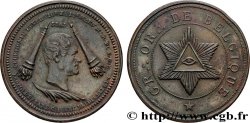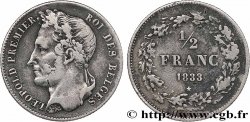Back 1/1
fwo_763694 - BELGIUM - KINGDOM OF BELGIUM - LEOPOLD I 10 Francs or, tête nue 1849 Bruxelles
Not available.
Item sold on our e-shop (2023)
Price : 1 600.00 €
Item sold on our e-shop (2023)
Price : 1 600.00 €
Type : 10 Francs or, tête nue
Date: 1849
Mint name / Town : Bruxelles
Quantity minted : 37000
Metal : gold
Millesimal fineness : 900 ‰
Diameter : 19 mm
Orientation dies : 6 h.
Weight : 3,18 g.
Edge : cannelée
Rarity : R3
Obverse
Obverse legend : LEOPOLD PREMIER - ROI DES BELGES.
Obverse description : Tête nue de Léopold Ier à droite ; signé L WIENER au-dessous.
Reverse
Reverse legend : L'UNION FAIT LA FORCE/ 10 - FCS/ 3,166 - 1849 - 900/M.
Reverse description : Écu entouré du collier de l'ordre de Léopold, posé sur un manteau couronné, brochant une main de justice et un sceptre.








 Report a mistake
Report a mistake Print the page
Print the page Share my selection
Share my selection Ask a question
Ask a question Consign / sell
Consign / sell
 Full data
Full data











